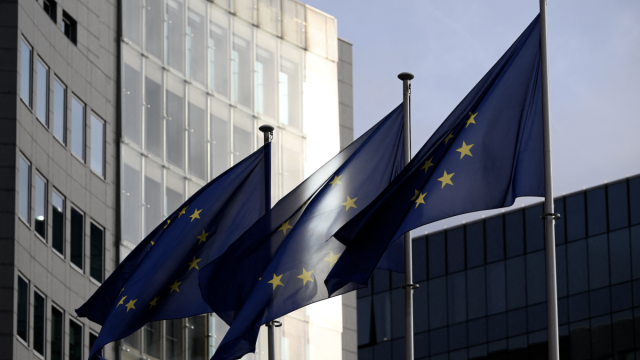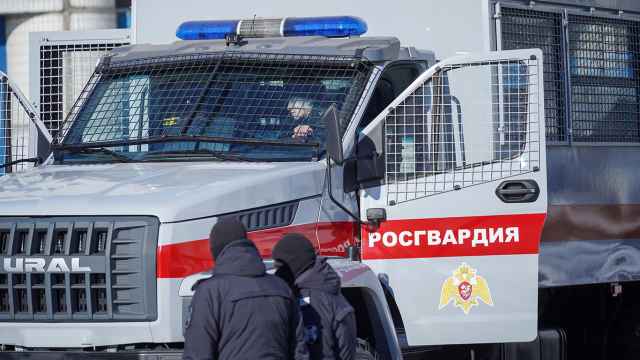More adults smoke in Russia than in any other heavy-smoking country, and their average life expectancy is one of the shortest among former Soviet countries, according to two separate but thematically linked reports released Tuesday.
Politicians and analysts said the popularity of smoking, which contributes to worsening demographics by killing up to 500,000 Russians a year, could be stopped through tougher regulations, but tobacco producers have blocked all efforts for years, successfully lobbying their interests with the ruling United Russia party.
With 44 million adults, or almost 40 percent of the population, Russia has the biggest percentage of adult smokers among the 14 countries surveyed by the World Health Organization in a poll presented at a Moscow conference Tuesday.
More than 60 percent of Russian men and almost 22 percent of Russian women smoke, according to the WHO's Global Adult Tobacco Survey.
The poll also covered Bangladesh, Brazil, China, Egypt, India, Mexico, the Philippines, Poland, Thailand, Turkey, Ukraine, Uruguay and Vietnam — countries that “bear the highest burden of tobacco use,” the survey said.
The survey is "not a document but a call to take action," Luigi Migliorini, acting head of the WHO's Russia office, said at a conference where the report was presented Tuesday, RIA-Novosti reported.
Some 400,000 to 500,000 Russians a year die from smoking-related causes, a figure that accounts for 17 percent of the country's yearly mortality rate, a co-author of the report, Oleg Storozhenko, told the conference, Interfax reported.
Separately, a study the Audit Chamber released on Tuesday said Russia lagged behind most other former Soviet republics in life expectancy.
Only Kazakhstan and Turkmenistan have a life expectancy lower than in Russia, the chamber said in an e-mailed statement. It did not provide exact figures for life expectancy in the countries in question. Russia's average life expectancy was 62 years for men and 74 years for women in 2008, according to the latest figures from the WHO.
The omnipresence of tobacco advertising, as well as the promotion of smoking by movies and television, contributes to the high smoking rate, Alexander Lyakhovich, a public health researcher with the Sechenov Moscow Medical Academy, said by telephone.
Another reason is low income, which means that families cannot afford healthy leisure activities, including sports, said Lyakhovich, who heads a department at the academy's Research Institute for Public Health and Medical Administration.
To reduce smoking, authorities need to introduce curfews on the sale of cigarettes, ban cigarette sales in easily accessible street kiosks, prohibit smoking in all public places, toughen penalties for selling cigarettes to minors, and promote healthy lifestyle among students, said Igor Lebedev, head of the Liberal Democratic Party's faction in the State Duma.
Excise duties on tobacco goods are among the lowest in Europe, keeping cigarette prices low. Lebedev told The Moscow Times that some of his colleagues have been campaigning to increase excise duties for 10 years.
Tobacco producers capitalize on the domination of the United Russia party, which controls the Duma, because "it is easier for a cigarette lobby to come to terms with one party," Lebedev said.
But change may be around the corner after Prime Minister Vladimir Putin signed off on a state program in September to reduce smoking over the next five years. Finance Minister Alexei Kudrin said in September that higher excise duties would boost the government's spending on social needs.
The Finance Ministry has drafted a bill to boost excise duties on alcohol and tobacco over 2011 to 2013. The legislation was approved by the Duma in a first reading in October, but no date has been set for a second reading.
Igor Beloborodov, head of the Institute for Demographic Studies, said unhealthy lifestyles, including smoking and drinking, contribute to the less-than-impressive life expectancy in Russia, but he questioned the thesis that most other former Soviet republics have a higher life expectancy.
Europe has better anti-smoking programs than Russia, and Russians drink stronger alcohol than residents of many European countries, especially central and southern ones, Beloborodov said. But the life expectancy in central Russia is still close to that of Europe, while the situation is much more dismal in post-Soviet Central Asian countries, notorious for their poor record on children's deaths, epidemiological situations and health care resources, he said.
Still, he added, Siberia and ethnic republics such as Kalmykia might spoil the overall statistics for the country because their harsh climate and residents' lack of access to quality medical care might reduce life expectancy in those regions.
A Message from The Moscow Times:
Dear readers,
We are facing unprecedented challenges. Russia's Prosecutor General's Office has designated The Moscow Times as an "undesirable" organization, criminalizing our work and putting our staff at risk of prosecution. This follows our earlier unjust labeling as a "foreign agent."
These actions are direct attempts to silence independent journalism in Russia. The authorities claim our work "discredits the decisions of the Russian leadership." We see things differently: we strive to provide accurate, unbiased reporting on Russia.
We, the journalists of The Moscow Times, refuse to be silenced. But to continue our work, we need your help.
Your support, no matter how small, makes a world of difference. If you can, please support us monthly starting from just $2. It's quick to set up, and every contribution makes a significant impact.
By supporting The Moscow Times, you're defending open, independent journalism in the face of repression. Thank you for standing with us.
Remind me later.





